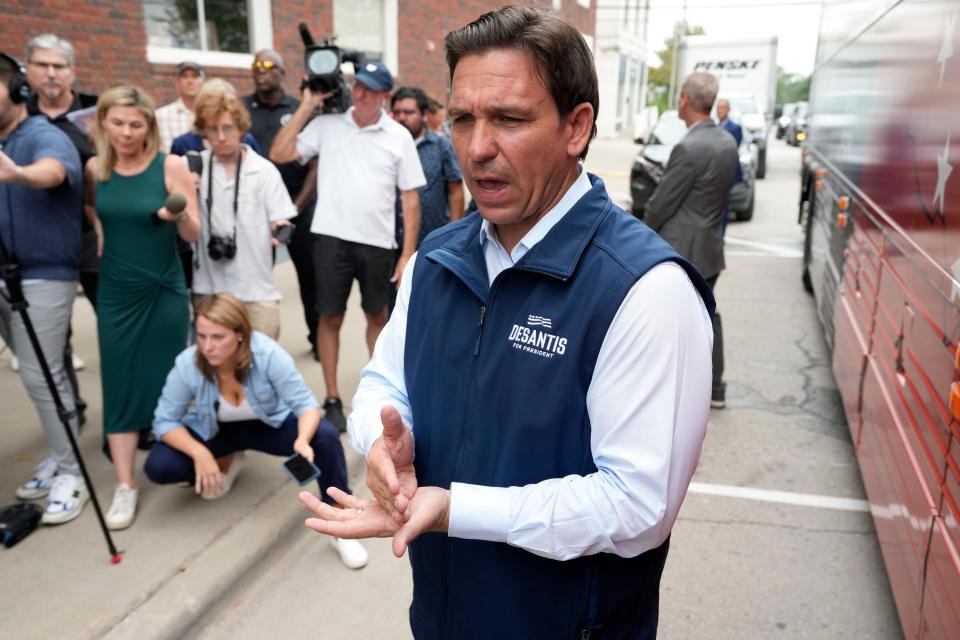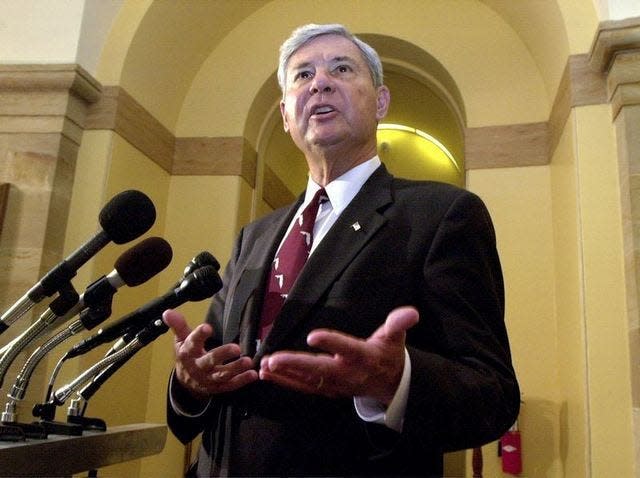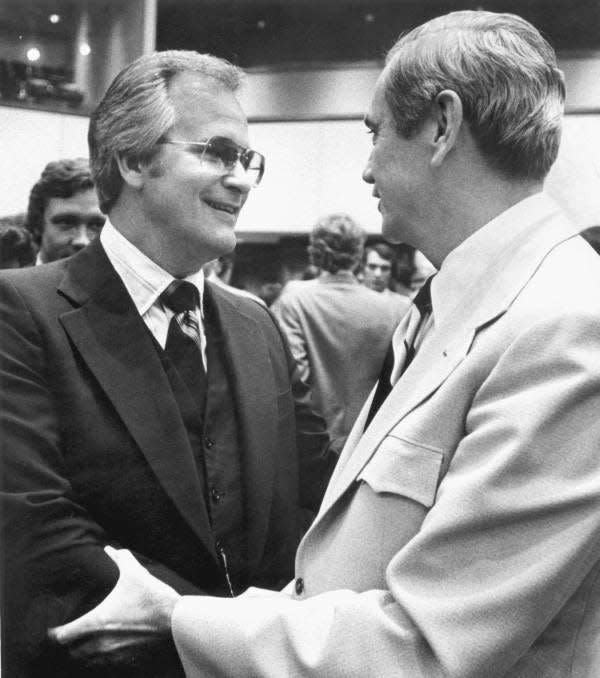Like earlier Florida presidential hopefuls, DeSantis struggling in deep political water
- Oops!Something went wrong.Please try again later.
- Oops!Something went wrong.Please try again later.
- Oops!Something went wrong.Please try again later.
- Oops!Something went wrong.Please try again later.
- Oops!Something went wrong.Please try again later.
- Oops!Something went wrong.Please try again later.
TALLAHASSEE – Shedding one-third of his campaign staff and needing to reboot his presidential bid only two months in, Gov. Ron DeSantis is struggling in political waters which have proved treacherous for Florida White House wannabes.
Former Florida governors Reubin Askew, Bob Graham and Jeb Bush, along with U.S. Sen. Marco Rubio, all launched White House bids on the strength of in-state popularity and rising hype on the national stage, only to see their candidacies go under, sometimes well before primary season.
DeSantis at this point remains half-a-year away from the first presidential nominating contest – the Iowa caucus. But amid rising questions about his future, the governor’s allies are convinced better days are ahead.
“Tell me one campaign that didn’t reboot; it’s the way these things go,” said Slater Bayliss, a top campaign finance bundler for DeSantis, who attended the recent retreat in Park City, Utah, where the governor’s redirection was unveiled.
DeSantis plans to focus his campaign on the Iowa caucus and New Hampshire primary, smaller-scale events and making himself available for more mainstream media appearances.
Bayliss, a Tallahassee lobbyist closely involved in Bush’s presidential campaign, along with those of his brother, former President George W. Bush, John McCain and Mitt Romney, insisted that DeSantis can still overtake the GOP frontrunner, former President Donald Trump.
“The DeSantis campaign has acted more swiftly than any other that I’ve been involved with when it comes to recalibrating the (financial) burn rate and focusing on the things that are working,” he added.
Soaring campaign comes back to earth
But after blowing through 40% of the $20 million he took in during his first six weeks as a candidate, DeSantis’ belt-tightening and recalibration is bringing his once-soaring campaign back to earth, with a thud.

Even with that spending, millions more remain in his allied, Never Back Down PAC. But DeSantis has fallen further behind Trump in most polls. Real Clear Politics’ polling average has him trailing Trump by more than 30%, nationally and in critical Iowa.
DeSantis remains, though, Trump’s closest Republican rival.
“Campaigns can suffer from missed expectations,” said Alex Conant, a Republican consultant who advised and served as spokesman for Rubio during his 2016 presidential run. He is unaffiliated in this latest contest.
“Everyone expected that DeSantis would be very competitive with Donald Trump in the polls right now. Instead, Trump has been able to widen the gap. That hurts the fund-raising, hurts media coverage and hurts with campaign morale,” Conant said. “You can recover. But it’s part of why running for president is so hard.”
Odds don't favor governors
In recent decades, only two sitting governors have won the presidency: Bill Clinton and George W. Bush. But the list of failures is long, including Wisconsin Gov. Scott Walker and Texas Gov. Rick Perry, both seen as powerful, well-funded candidates who flamed out months before the 2016 primaries.
“The difference between running for president and running for state office is not just major leagues and minor leagues, it’s totally different sports,” Conant told the USA TODAY NETWORK-Florida. “There’s nothing in the world like presidential politics and I don’t think anything can prepare you for the stress and scrutiny of running for president.”
Among Floridians who ran, Rubio ended his White House bid in 2016 after losing to Trump in a landslide in his home state primary, a month after Bush folded following distant finishes in Iowa, New Hampshire and South Carolina.
Reboot needed for floundering campaign: With presidential campaign stalled, DeSantis reboots at luxury resort, lays off staffers
Florida has been DeSantis test kitchen: A presidential prelude playbook: Why DeSantis is driving Florida hard right
Like DeSantis, Bush had launched his presidential run with enormous amounts of money in the bank but, also like the current Florida governor, was relentlessly attacked by Trump.
While Bush never recovered or captured the hearts of a Republican electorate profoundly changed from his earlier years as governor, DeSantis is campaigning largely as a more electable version of Trump.
Culture war campaign may prove costly
But DeSantis’ culture war politics, amped up during the campaign, not only has alienated Black and LGTBQ voters and those who believe in the science behind COVID-19 vaccinations, the Financial Times reported that two of his wealthiest backers, billionaires Ken Griffin and Nelson Peltz, are rethinking their support because of his far-right positions.
Separately, a pair of recent DeSantis fund-raisers planned for Long Island also were reportedly canceled because of a reported lack of donor interest.
Trump has attacked DeSantis non-stop, contributing to the governor’s woes. But DeSantis also is confronting a hard lesson learned by other Florida leaders with White House ambitions.
“Running nationally is a different ball game,” said Robin Gibson, a Lake Wales lawyer and legal advisor to former Florida U.S. Sen. Bob Graham, a two-term governor, who sought the Democratic presidential nomination in 2004.

Unable to attract money and support, Graham’s campaign lasted only nine months – and he became the first of 10 Democrats in the presidential field that year to quit. He never made it to the primary states.
“Bob wanted very much to be himself,” Gibson said of the centrist Democrat, well-liked in Florida and respected on Capitol Hill for his national security expertise. “We wanted to run things modeled on how he had been so successful in Florida. But the national scene is a blood sport.”
Gibson said that dealing with dueling advice from campaign consultants hampered Graham’s approach, taking him off his game and, ultimately, hurting his appeal to donors and voters.
Twenty years earlier, Askew, another popular two-term Florida governor, also ran a White House campaign that ended well short of 1600 Pennsylvania Avenue.

Askew had just been named one of the nation’s 10 best governors of the previous century by Harvard University’s Institute of Politics when he launched his run for the 1984 Democratic nomination.
But Askew, who Graham succeeded, had been out of elected office since 1979. He struggled with a Democratic Party seeking a new route following the defeat of President Jimmy Carter, a fellow, former southern governor.
After a disappointing, last-place finish in the early, New Hampshire primary, Askew ended his bid for the nomination eventually won by Minnesota U.S. Sen. Walter Mondale.
Unlike Jeb, Can DeSantis Fix It?
Until DeSantis’ reboot, Bush may have had the most memorable overhaul, months into the race he eventually ended by spring of 2016 after running down a robust campaign war chest and performing miserably in early primary states.
Just as many are now tarring DeSantis, Bush ran a wonky campaign focused on his success leading Florida. His reboot, centered in part on the theme, “Jeb Can Fix It,” emphasizing his experience – again, in contrast with first-time politician Trump.
Bush continued to promote his Florida record during lengthy, sit-down interviews with major TV networks and engage with reporters on his campaign bus about the direction of the race.
But like DeSantis, so far, he never could overcome Trump.
Some analysts, including Romney, now a U.S. senator from Utah, say the crowded field of Republican candidates is playing into Trump’s hands. Romney is urging those in the race who face little chance of winning to drop out.
Since kicking-off his campaign, DeSantis has been locked into second place behind Trump in most surveys.
For DeSantis, a winnowed field may help. If he can keep his campaign going until it emerges.
“It’s like Baskin-Robbins and its 31 flavors; it’s a lot easier when you just can choose between chocolate and vanilla,” said Susan MacManus, a professor emerita in political science at the University of South Florida.
“When you spread the field out, it helps the incumbent. And Trump is like the incumbent in the Republican race,” she added.
John Kennedy is a reporter in the USA TODAY Network’s Florida Capital Bureau. He can be reached at jkennedy2@gannett.com, or on Twitter at @JKennedyReport
This article originally appeared on Tallahassee Democrat: DeSantis Déjà vu? Florida can be treacherous for presidential dreams

